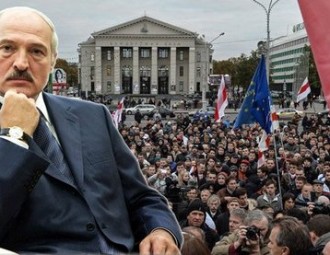Euobserver: Belarus opposition seeks EU help for round-table talks
 photo by politobzor.net
photo by politobzor.net
In 1999 this plan came off second-hand. Will Europe help now?
Five Belarusian opposition leaders have appealed for EU help to restart internal talks on democratic reform.
In an open letter to the heads of the EU institutions on Friday (30 October) they said the bloc should use its leverage on president Aliaksandr Lukashenka to restart round-table talks, mothballed in 1999, informs Euobserver.
They said the “negotiation process”, which should include mediators from the OSCE, the Vienna-based rights watchdog, and from the EU, could “broaden the area of freedom” for reformists.
They also urged the EU to push for changes in Belarus parliamentary elections next year, for instance, by getting Lukashenka to let opposition delegates sit on electoral commissions and by securing an “open and transparent” vote count.
The letter came after the EU, last week, suspended, for four months, its visa ban and asset freeze on Lukashenka’s nomenklatura.
The EU did it because he freed political prisoners and because there was no new crackdown after last month’s presidential vote.
But the five opposition chiefs - Sergei Kaliakin, Anatoly Liabedzka, Vladimir Niakliaeu, Pavel Sieviarynec, and Nikolai Statkevich - said the EU re-engagement causes “concerns” because it isn’t conditional on a new role for civil society.
They said Lukashenka’s line - that Europe needs him to protect Belarus from Russian revanchism - is just a “tool to keep power”.
They noted that if he restarts the 1999 process and enacts electoral reform, the EU should “abolish” the visa bans.
They also noted he needs Western money more than ever because the Belarusian economy is in “crisis” amid a “considerable reduction” in Russian subsidies.
Two other opposition leaders - Aliaksandr Milinkevich and Tatsiana Karatkevich - didn’t sign the letter.
Milinkevich is, reportedly, to leave politics.
'Constructive opposition'
But Karatkevich - the only reformist allowed to run against Lukashenka in October’s presidential vote - didn’t sign because she has a different programme.
She recently told EUobserver her model of “constructive opposition” aims to improve ordinary people’s lives, for instance, by electoral and police reform, instead of pushing for democratic transition.
She aims to appeal to a new constituency - family people in the 25 to 55 age-range - who never before took an interest in politics and who have no faith in anti-Lukashenka street rallies.
“We [the opposition] have to adapt to this mood in society, to learn from our mistakes, and to come up a with a new, more positive strategy”, she said.
Her top aide, Andrei Dzmitryeu, added: “Now isn’t the time to call for mass protests … People are tired of fighting [the regime] with no result, so we’re trying to find another way”.
Some Belarusian activists don't believe in either model.
"Lukashenka will never agree to anything that will eliminate him", one contact, who asked not to be named, told this website.
"The EU cannot knock on his door, hand him a gun, and say: 'Here, Mr. President, please be so kind as to shoot yourself in the name of democracy'. Free elections will take place in Belarus only after Lukashenka".
Buffer or partner?
But for his part, Petras Austrevicius, a liberal MEP from Lithuania who works with Belarus dissidents, endorsed the round-table proposal.
“These brave and dedicated people, real patriots ... are now vocal about the future of Belarus and we must listen to their voice. Otherwise, this [EU] policy of 're-engagement' is going to be built on fake foundations”, he told this website.
Echoing the letter's concern - that the EU is propping up Lukashenka to contain Russia - he added: “Throughout history, we know how ‘buffer states’ end - by being invaded, occupied, divided, or annexed”.
"To me, Belarus is an eastern partner of the EU - a very complicated one, with a lot of shortcomings, but still a partner".
-
03.01
-
07.10
-
22.09
-
17.08
-
12.08
-
30.09








































